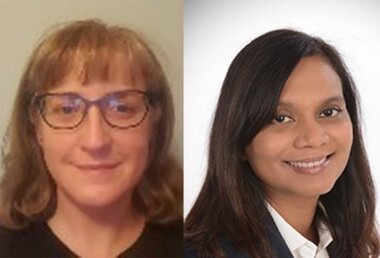15 March 2023
Dr Kate Hunt [pictured, left, below] and Dr Dulmini Kariyawasam [right] share progress of two related projects to improve diabetes care for young adults in south east London.
NHS England Pilot:
Our clinical academic partnership is delighted to be supporting the Diabetes Transition and Young Adult Service Expansion pilot. The pilot is a joint project across Guy’s and St Thomas’ NHS FT, King’s College Hospital NHS FT, Southwark Community Diabetes service and Lambeth Intermediate Diabetes service to expand their services for young people (up to age 25) with diabetes.
The pilot has expanded the current provision of services for young adults with type 1 diabetes at both acute Trusts. The pilot has also launched the new service for patients with type 2 diabetes in Lambeth and will launch the service in Southwark in March 2023. The pilot is establishing patient and public involvement groups from both the type 1 and type 2 patient cohorts.
Once the new services are fully launched, the pilot will then use co-design techniques to tailor the services. The pilot is developing a risk stratification tool and pathways to align the King’s College Hospital NHS FT and Guy’s and St Thomas’ NHS FT Young Adult Diabetes services.
The pilot will continue to develop the services for young adults living in Lambeth and Southwark until it finishes in April 2025.
Development of an Education & Support programme for Young People with Type 2 Diabetes:
In a related project, the Diabetes, Endocrinology and Obesity team is also supporting a project to develop an education and support programme for young people with type 2 diabetes.
It is well-evidenced that people who develop type 2 diabetes at a young age are more likely to develop life-changing cardiovascular and diabetes complications. A recent King’s College London medical student project has shown that of young people aged 16-24 years living with type 2 diabetes in Southwark, 59% are of Black ethnicity and 11% are of Asian ethnicity, and 82% live in the two most deprived IMD quintiles.
Effective management of glucose, weight, blood pressure, cholesterol, smoking cessation, early detection and management of complications (the ‘nine annual care processes’) reduces the risk of life-changing complications.
However, the National Young People with type 2 diabetes audit (2019-2020) showed people with type 2 diabetes at a young age (<40 years) are less likely to have all annual care processes and are less likely to have glucose levels at target.
Our student project has also shown high use of emergency hospital services by young people with type 2 diabetes in Southwark (59% had at least one A&E attendance and/or hospital admission in 2021, with 27% having at least one hospital admission).
Sustained exercise and dietary changes, alongside taking medications and attending clinics, are key in managing type 2 diabetes to reduce the risk of long-term complications. However, understanding the need for this and implementing and sustaining change is very difficult to achieve.
There are national education programmes for people with type 2 diabetes (such as DESMOND) but these focus on providing information and are designed with older age groups in mind (as most people with type 2 diabetes are older). Whilst we also know that having access to information is important, motivation to make sustained changes to lifestyle and diabetes is what makes a difference in health outcomes.
There are local programmes such as HEAL-D, which was designed to support people from Black ethnic backgrounds with type 2 diabetes, but again this was not designed specifically for young people. As such, these programmes are not suitable for young people, who have very different life experiences and needs.
To address this gap in provision, in October 2022, the young adult diabetes teams at King’s College Hospital NHS FT and Guy’s and St Thomas’ NHS FT acquired funding via Partnership Southwark from NHS England Targeted Investment in Health Inequalities scheme. We plan to use a co-design process with young people with type 2 diabetes to develop and then pilot an education and support programme specifically designed for young people with type 2 diabetes.
So far, we have recruited a specialist dietitian who will drive co-design and pilot implementation of the programme. We have recruited health and wellbeing practitioners who have expertise in working and engaging with young people. We have involved colleagues from King’s College London, King’s College Hospital NHS FT and Guy’s and St Thomas’ NHS FT with relevant expertise. Project management is being provided through KHP DEO Clinical Academic Partnership.
The health and wellbeing practitioners are currently working to engage young people with type 2 diabetes in Southwark and Lambeth in the co-design process.
At the end of the first 12 months, we aim to have produced a programme framework, which we will then pilot over the following six months. We do not expect clear identifiable changes in clinical outcomes within the 18 months. However, in the pilot phase we do expect:
- Increased engagement with diabetes care services;
- Improved process outcomes (completion of the ‘nine annual care processes’);
- Improved patient experience.
It is hoped that, if successful, we will expand the programme more widely across south east London and beyond.
Dr Dulmini Kariyawasam is Consultant in Diabetes, Endocrinology and General Internal Medicine at Guy’s and St Thomas’ NHS FT. Dr Kate (Katherine) Hunt is Consultant in Diabetes and General Medicine at King’s College Hospital NHS FT.
Want to know more? Please email DEO
Liked this article? Find out more about the important work King’s Health Partners Diabetes, Endocrinology and Obesity is doing to improve health and wellbeing for people living with diabetes, obesity and endocrine disorders across London, south east England and beyond.





